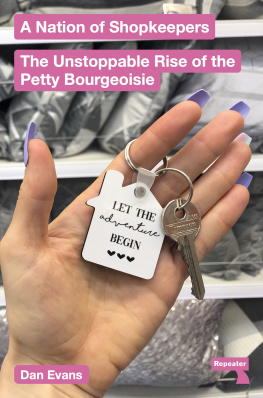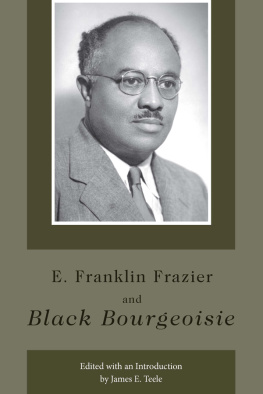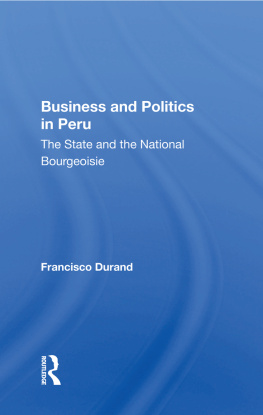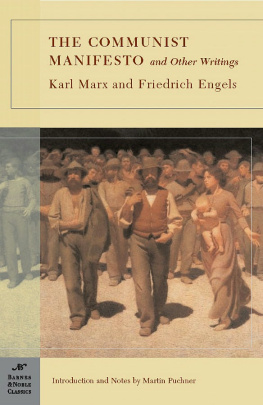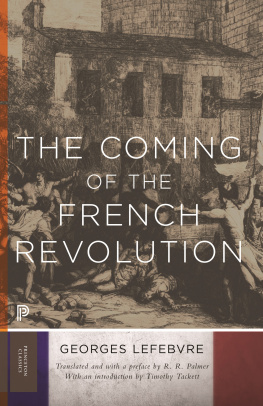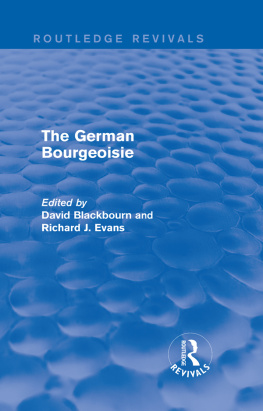
An intriguing, very political, and unexpectedly personal book for those who are obsessed with class and the global failures of the left.
ALPKAN BIRELMA, ZYEIN UNIVERSITY
A brilliant account of how and why working class and middle class have become such useless labels in the UK, and how we are actually divided.
DANNY DORLING, AUTHOR OF SLOWDOWN
A brilliant examination of the life and ideology of the petty bourgeoisie, the silent majority of normal people whose safe, suburban, newbuild lifestyle belies their huge political influence and violent history.
JOE GLENTON, AUTHOR OF VETERANHOOD
An enjoyable and timely provocation, A Nation of Shopkeepers insists on a redirection of sociological, anthropological and journalistic energy away from a mythicised working class and towards a middle class whose internal conflicts are of far more use to an understanding of contemporary Britains fault-lines than any of the simplistic geographic distinctions proposed by writers of all political stripes in recent years.
JOE KENNEDY, AUTHOR OF AUTHENTOCRATS
A book of theoretical and political clarity that will help all of us think through the political and economic striation of the petty bourgeoisie.
CATHERINE LIU, AUTHOR OF VIRTUE HOARDERS
A fantastically written romp filled with humour and pathos which takes us through the history and peculiarities of the British Class system and its connections to modern British politics.
LISA MCKENZIE, AUTHOR OF GETTING BY
A brilliantly readable exploration of the difficulties and the necessity of class analysis for any imaginably successful left politics.
WALTER BENN MICHAELS, AUTHOR OF THE BEAUTY OF A SOCIAL PROBLEM
A fascinating and accessible account of a social class that is too often neglected or misunderstood.
TOM MILLS, AUTHOR OF THE BBC
An incisive, erudite and provocative analysis of the changing class composition and dynamics in Britain. A Nation of Shopkeepers will be central to future debates on class in Britain and further afield.
PAUL OCONNELL, CENTRE FOR HUMAN RIGHTS LAW, SOAS
A vivid and passionate account of the renewal of class divisions in British society and the visceral forms they take. Anyone who doubts the relevance of contemporary class divides is encouraged to read this book.
MIKE SAVAGE, AUTHOR OF THE RETURN OF INEQUALITY
Does a terrific job of helping us break out of classic class schemas that are either too abstract to help practical political interventions or have not kept up to date with the evolving and complex developments in the formation of classes in Britain.
MIKE WAYNE, AUTHOR OF ENGLANDS DISCONTENTS
For those serious about making sense of class and the potential for transforming society today, A Nation of Shopkeepers makes an important contribution.
JAMIE WOODCOCK, AUTHOR OF MARX AT THE ARCADE
Published by Repeater Books
An imprint of Watkins Media Ltd
Unit 11 Shepperton House
89-93 Shepperton Road
London
N1 3DF United Kingdom
www.repeaterbooks.com
A Repeater Books paperback original 2023
Distributed in the United States by Random House, Inc., New York.
Copyright Dan Evans 2023
Dan Evans asserts the moral right to be identified as the author of this work.
ISBN: 9781913462697
Ebook ISBN: 9781913462925
All rights reserved. No part of this publication may be reproduced, stored in a retrieval system, or transmitted, in any form or by any means, electronic, mechanical, photocopying, recording or otherwise, without the prior permission of the publishers.
This book is sold subject to the condition that it shall not, by way of trade or otherwise, be lent, re-sold, hired out or otherwise circulated without the publishers prior consent in any form of binding or cover other than that in which it is published and without a similar condition including this condition being imposed on the subsequent purchaser.
Printed and bound in the United Kingdom by TJ International Ltd
To Mabli
CONTENTS
PREFACE
I have always been obsessed with class. If you are reading this book, then theres a chance that you are too.
Like many people, this obsession is rooted in my own personal history and background. My mum comes from a solidly middle-class family of school teachers. Her parents my grandparents both went to university, which would have been unusual in the 1950s. My dads life was very different. He was a PE teacher, but before that a bricklayer. His dad, my grandad, was a miner and steelworker. He didnt go to school, let alone university.
I grew up with a foot in both camps half working-class culture, half middle-class. Different sides of the family had different norms, accents, politics, leisure habits and even different life expectancies because of their class background. Having to straddle two worlds was confusing in a way that people who grow up in either straightforwardly working-class or middle-class households perhaps dont experience.
This was all heightened by where I grew up. Porthcawl is a small seaside town half way between Cardiff and Swansea in the borough of Bridgend. Porthcawl is widely considered to be posh by the standards of the area, an oasis within a solidly working-class, post-industrial region, and has historically voted Tory while the surrounding areas were until 2019 firmly Labour.
It is a town built on aspiration and social mobility historically, it has been where people from the south Wales valleys have a caravan, and then move or retire to if they can afford it. One old woman told me that people who own chip shops in the Welsh valleys move to Porthcawl like the Jews move to Israel. It was the consensus that once people moved to Porthcawl, their noses went up in the air; they started to think they were better than everyone else, forgot their roots and started voting Tory. Most of the people I grew up with, like me, had working-class parents from elsewhere.
I am a product of social mobility. Like many people raised under the welfare state, the Evanses from Port Talbot were upwardly mobile. Within three generations wed gone from mining and a council estate to university to the suburbs. However, its safe to say my life hasnt worked out like I planned it. The social mobility journey my family has been on since the 1930s is stalling with me. After I graduated, I spent a few years kicking around working in call centres and bars, and then stupidly went back to university to do a PhD. For about fifteen years now, my life has been a cycle of low-paid service work interspersed with stints in academia, moving back and forth between Porthcawl and Cardiff.
When I moved back to Porthcawl, first during my PhD and then later after being made redundant from yet another fixed-term academic contract, I found myself once again working behind the same bar that I had worked at during school and my PhD. Here, I came into contact with lots of my old school friends, many of whom were now very successful self-employed tradesmen. Others were salesmen, cops, soldiers. They were married to nurses, beauticians, hairdressers.
They had lots of money, or at least a lot compared to me. They had attractive girlfriends and wives, nice cars, and almost always owned their own house. Sometimes theyd come into the bar still in their work clothes and covered in paint, paying for drinks with wads of cash they never ever used card.
Everyone was sympathetic and confused about my lowly state. What the fuck are you doing back here, I thought you were a doctor, butt, arent doctors well paid?, and so on. Despite being the same age, they felt a lot older. More like men, more like our dads. They had entered manhood job, wife, children nearly as soon as they finished school and about a decade earlier than me.
Next page
